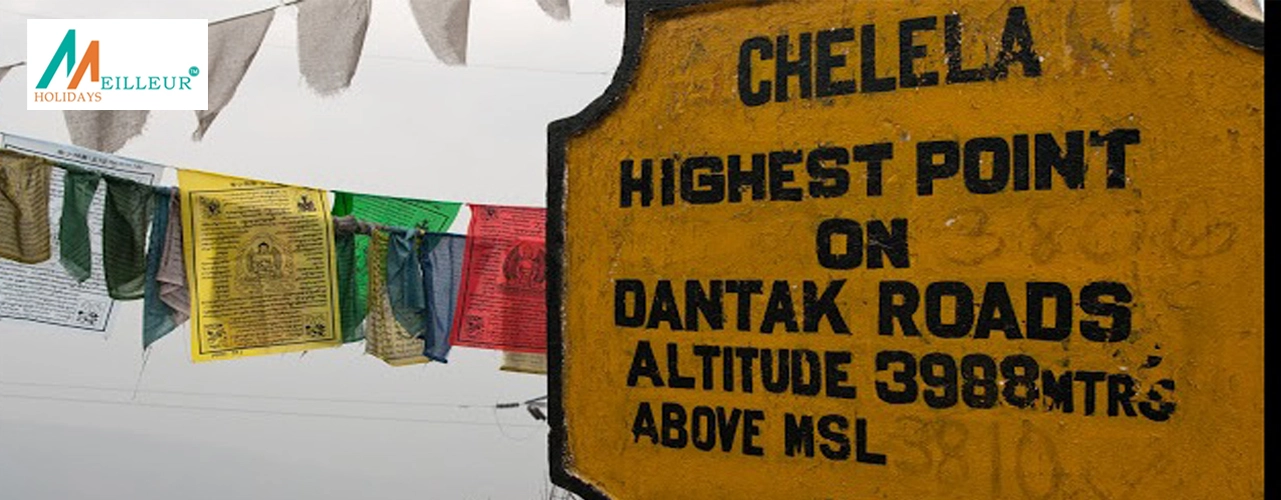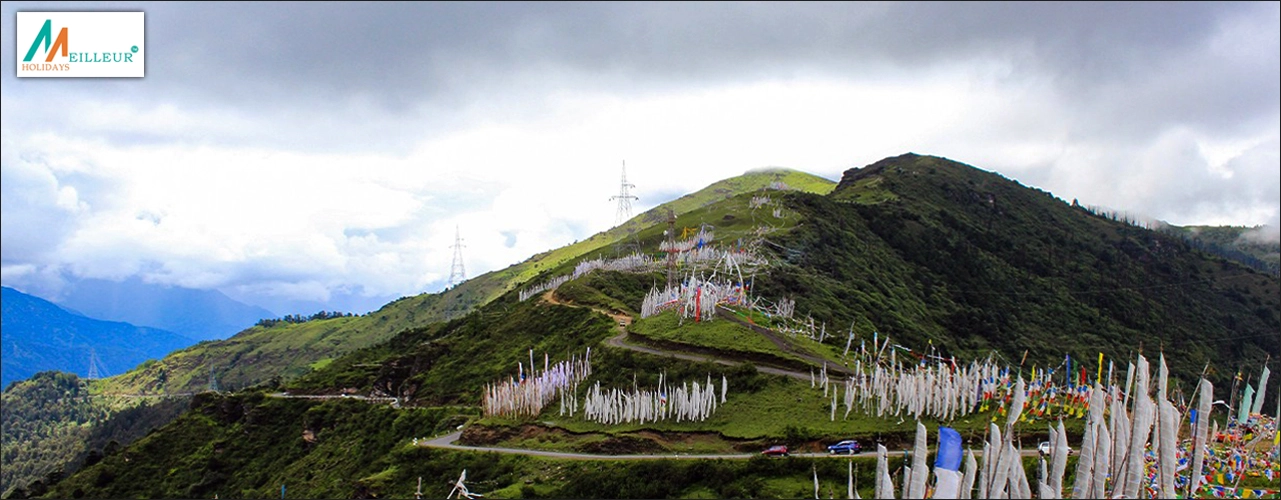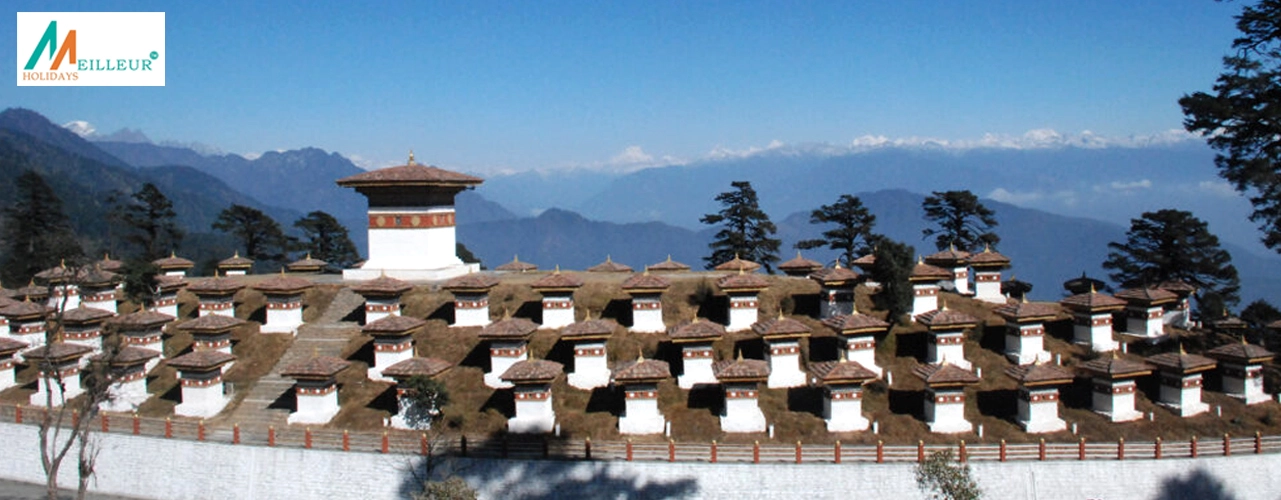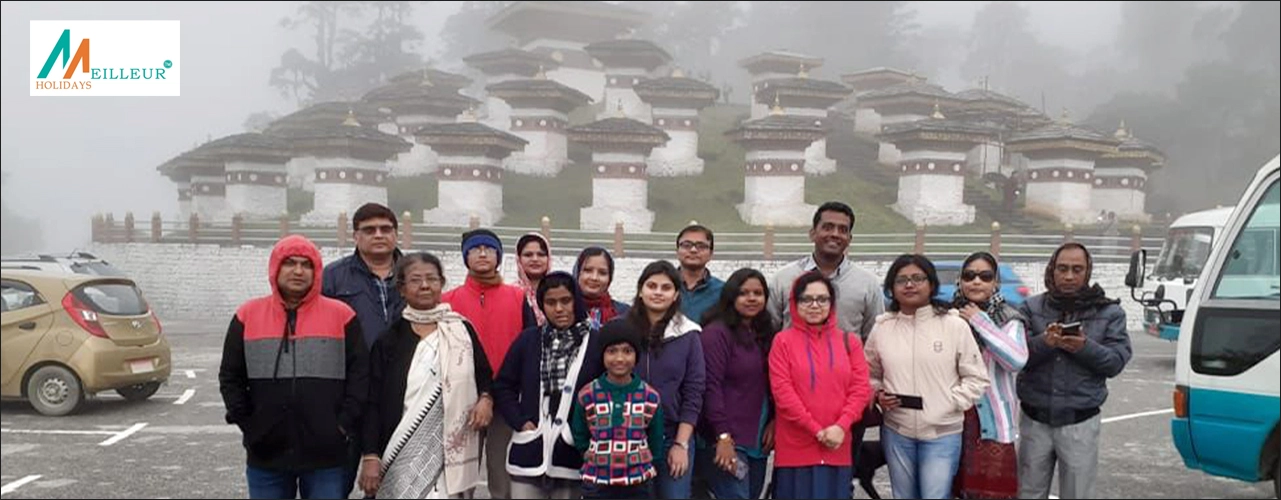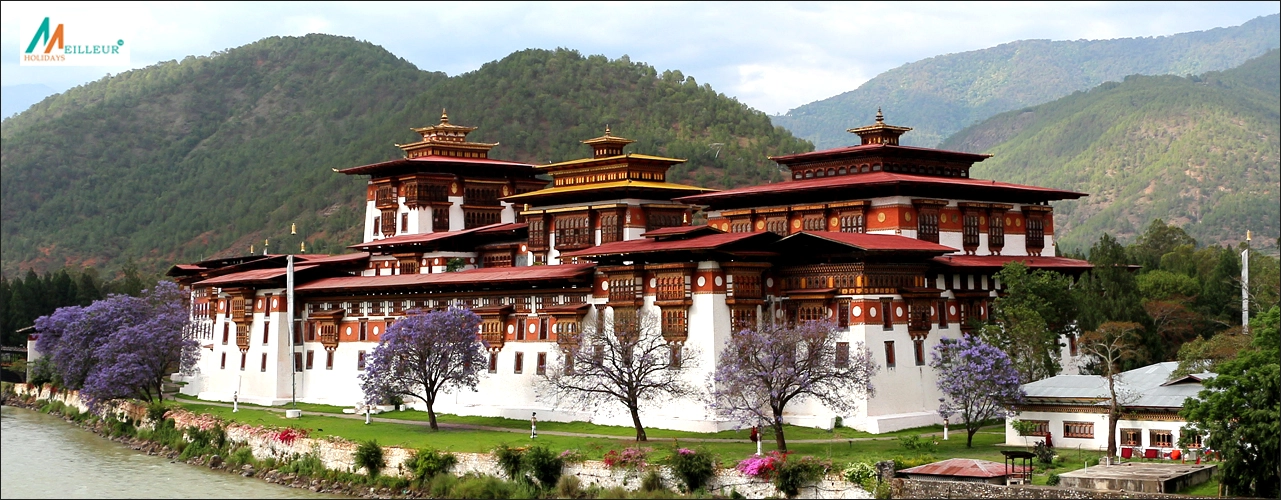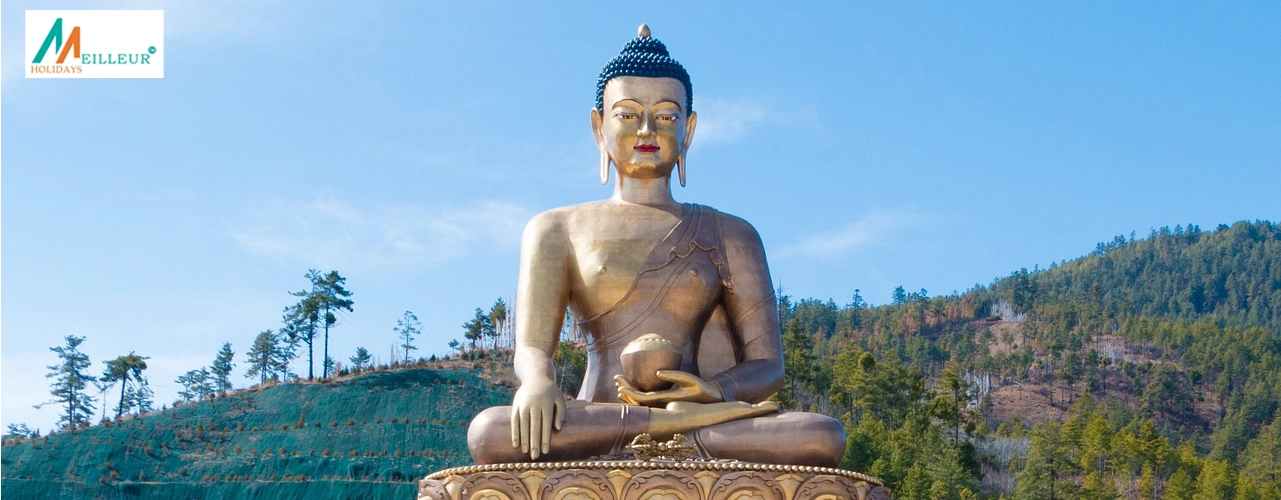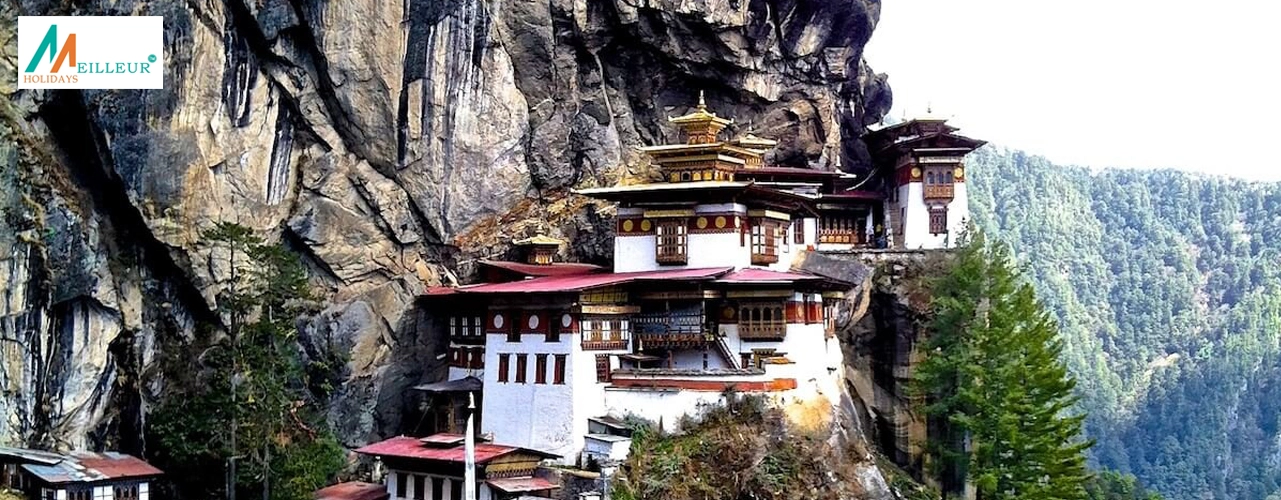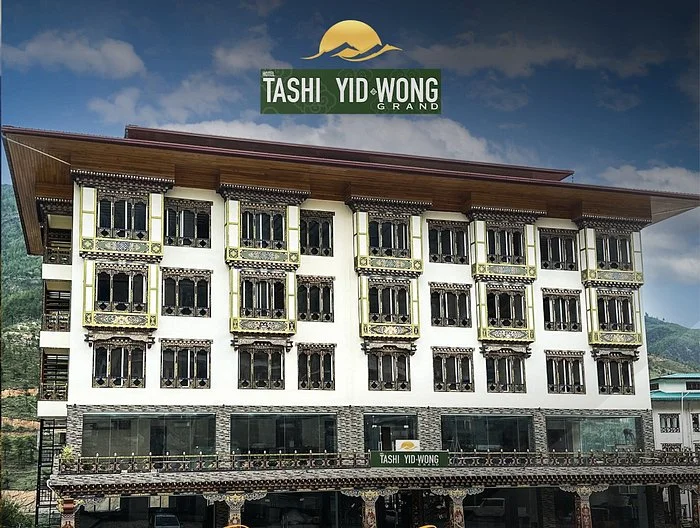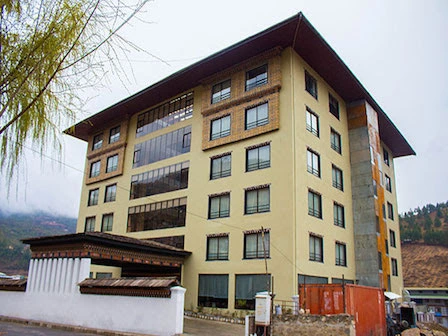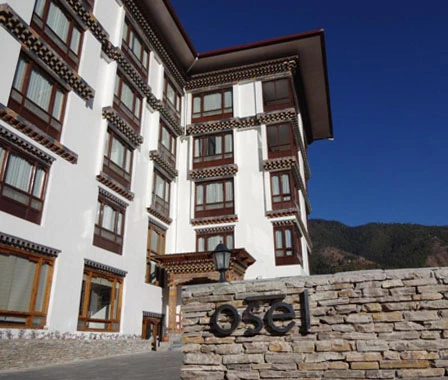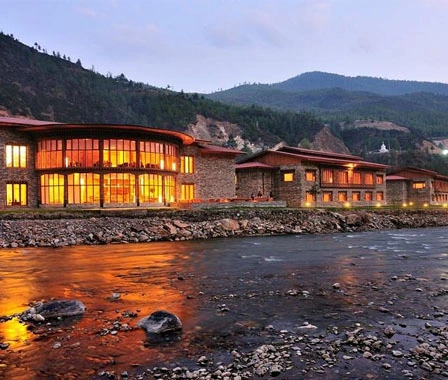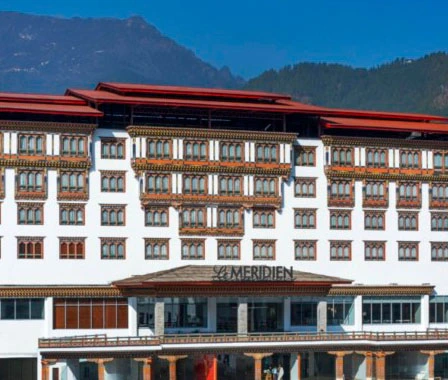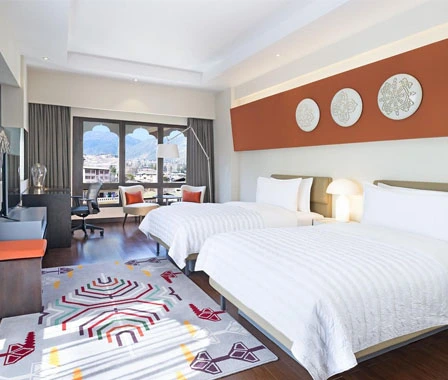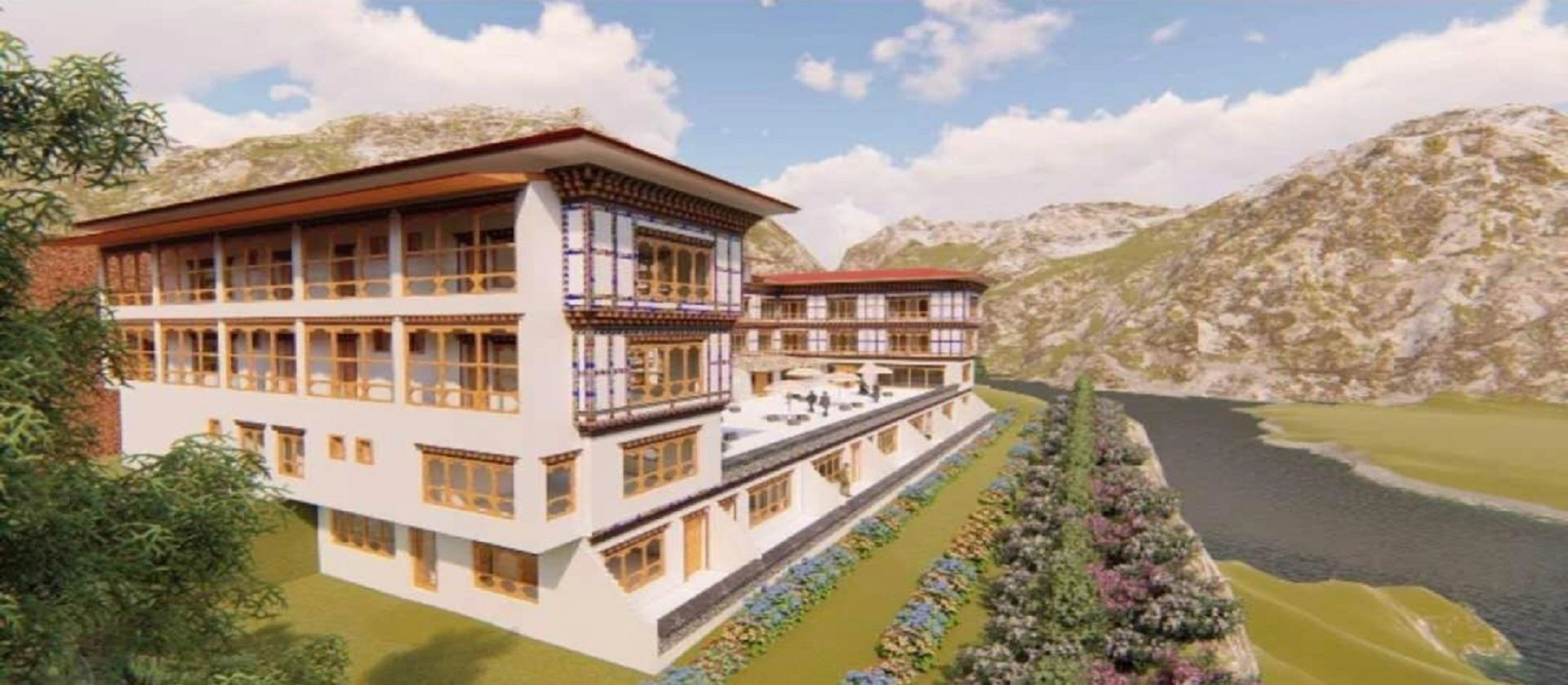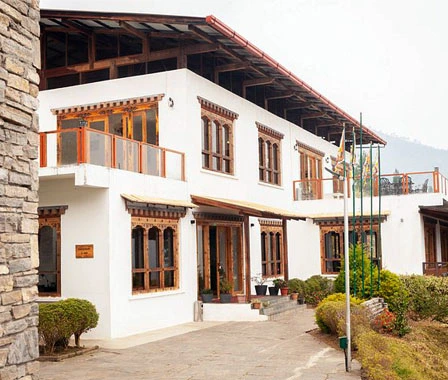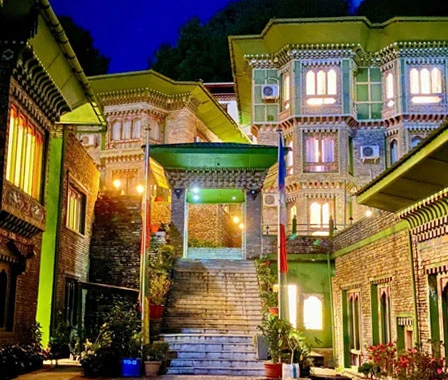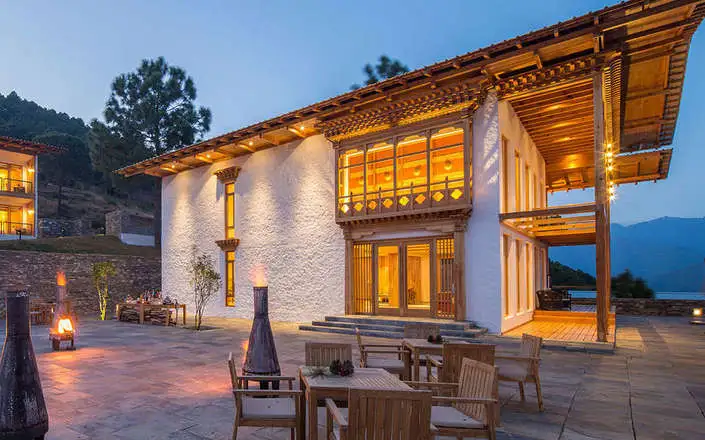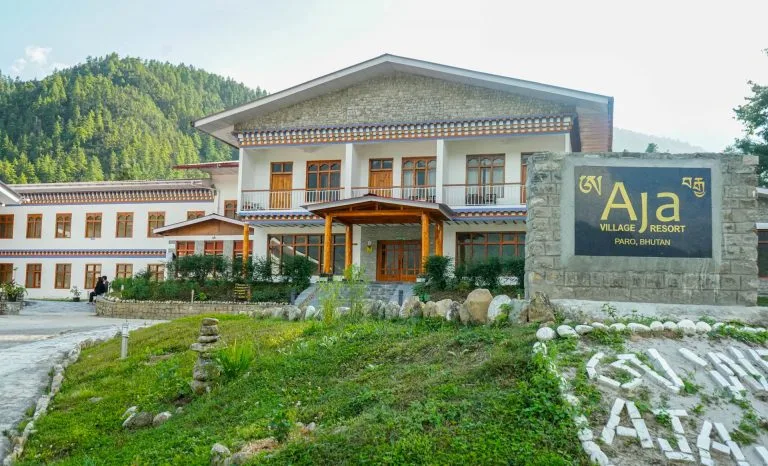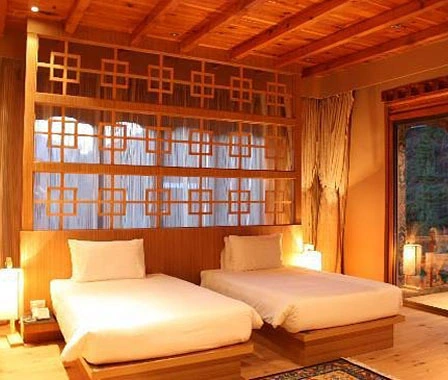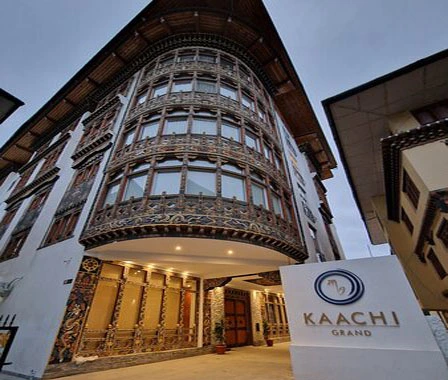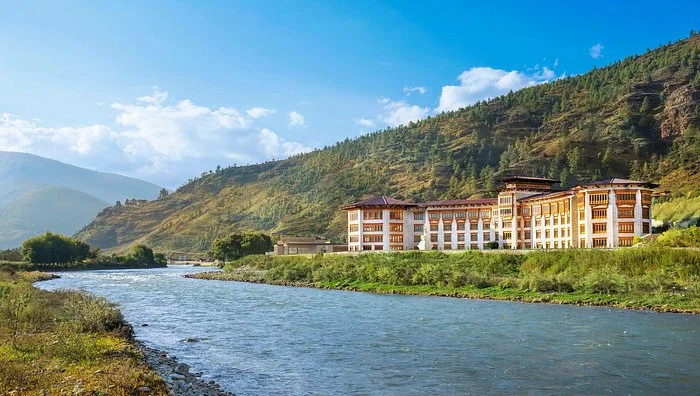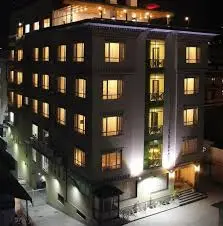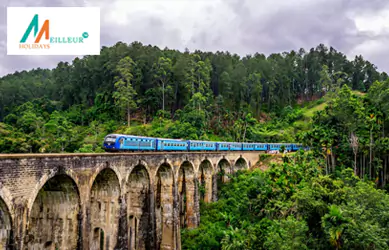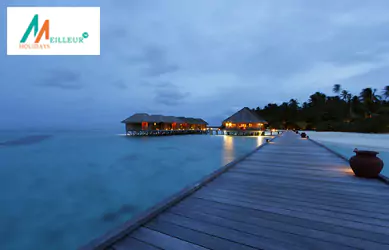SRILANKA PACKAGE TOUR - MEILLEUR HOLIDAYS
Rs 26000/-
Per Person
Bhutan - The Land of Thunder Dragon 6N / 7 D
BOOK ROYAL BHUTAN TOUR AT BEST PRICE
Bhutan Tour Packages 6N | 7D
DESTINATION : THIMPHU (2N) – PUNAKHA (01) – PARO (3N)
ORIGINATION : EX–BAGDOGRA AIRPORT / NJP RAILWAY STATTION
DURATION : 6 NIGHTS and 7 DAYS
Attractions of Bhutan Tour Packages -
Thimphu - Buddha point , Indigenous hospital, Art & Craft school, National Library, Royal goldsmith workshop,Handicraft centres, Memorial Chorten, 15th Century Changangkha monastery,Motithang mini zoo, Drupthob nunnery temple many more and Weekend Market.
Punakha / Wangdue - Punakha Dzong, Dochula Pass Mehsina village & visit Chime Lhakhang, Punakha Suspension bridge etc.
Paro - Taktshang or Tiger’s Nest monastery, Ta dzong ,Rinpung Dzong ,Dungtse Lhankhang,Nya-mey Zam,Ugyen Pelri Palace, Kychu lhakhang monastery, Chele la Pass , Haa Valley eye view from Paro airport view point.
Bhutan:
A country resting peacefully in the lap of eastern Himalayas is one of those very few places that can probably take you back in time. The unadulterated nature, around 73% of the land drenched in wild greenery, the flag with dragon engraved on it, the rice that is born red, the place which is believed to be haunted by multiple demons and protected by multiple gods, the innocence of the locals that still believe that snowman exists and dragons spit fire, the land that has preserved the rarest of the nomadic tribes and fauna on the list of 'red-alert' is what Bhutan is made up of. Not very well known amongst the tourist crowd, Bhutan indeed offers some mystical, magical places to visit for the intrepid traveler.
*** What mandatory in Bhutan post covid 19 attacks***
1. Sustainable development fee - short form "SDF"
Why SDF? Bhutan has a total population of 8 billion which is equivalent to the population of one small town in China / India. To protect the civilisation Royal Bhutan Government has taken special care to keep the country clean and strict measures for Hoteliers / Restaurant / Transporters. Even the government has started spending a big amount on hygiene. To keep Bhutan the safest country for travellers, this small amount is charged from the travellers.
2. Travel Insurance
Any unseen incident should not push travellers in trouble, so this insurance will cover any incidental charges.
>> 6N stay at above mention /similar property
>> MAP (6 breakfast + 6 dinner)
>> All transfer and sightseeing as per the itinerary
>> SDF
>> Travels Insurance (mandatory)
>> Professional tour guide Phuentsholing to Phuentsholing
>> Monument entrance fee
>> Air fare /train fare
>> Ac/Heater
>> All meals other than those specified in ‘cost includes’
>> Expenses of personal nature
>> Any other items not mentioned in ‘cost includes’
>> GST
1. Although Bhutan welcomes foreigners these days especially for those on their last-minute all-inclusive holidays, the country is extremely conscious regarding its culture.
2. The greeting in the Bhutanese language Dzonkha for hello is Kuzu Zangpola and says Tashi Delek for goodbye or good luck.
3. All the citizens, except India and Bangladesh, need VISA to enter into Bhutan. Which need to apply in advance.
4. Indian nationals need route permits to travel in Bhutan and this is provided by the Immigration department at Paro airport, Phuentsholing immigration office & by Thimphu offices for restricted area (Punakha, Wangdue, Bumthang, Chelela & Haa).
5. Either carry Nu (Bhutan's currency) or INR (Indian Rupees). Both is accepted in Bhutan, though 500 and 1000 Indian rupee notes might not be as easily accepted.
6. Use right hand while giving or receiving something. Pass the holy sites keeping them on your right side.
7. US dollars are pretty widely accepted in Bhutan, but you are still advised to exchange some of your currency to Bhutan's currency i.e. ngultrum (Nu) or Indian Rupee for buying small items and for the really remote places. There are not many ATM machines nearby except major cities like Thimphu, where also international ATM/credit cards might or might not work..
1. Tobacco is absolutely prohibited in Bhutan. The tourists might use it, but extra care should be taken. Selling
or giving tobacco to the locals is also a crime.
2. Make sure you take off your footwear before you enter into any religious place.
3. You are advised to dress discretely and modestly in Bhutan. If you’re visiting any Bhutanese temple (Tsechu), they’d admire you if you wear their national dress gho & kira. Also make some donation to Tsechu.
4. Foreign nationals are not permitted to carry Indian rupees across the border to and from India.
5. Buying and selling of antiques is strictly forbidden in Bhutan. Don't jump to give toys or treats to children in exchange for photo offers. Locals are careful not to breed a generation of children who beg tourists, as happens -but adults likely will not object out loud out of politeness.
1) Meilleur Holidays reserves the right to re-arrange itinerary to suit hotel availability without changing the total
number of days in each destination and without compromising any services.
2) The vehicle used is AC/NAC and is available for point to point services only and is not at disposal. Clients are
requested to follow the itinerary.
3) Payment of 50% of Package Cost at the time of booking and balance within 10 days prior travel date.
Booking is confirmed on payment of booking amount.
Less than 7 Days Prior to Date of Travel: 100% of the Package Cost as cancellation charge
a) 7 – 15 Days Prior to Date of Travel: 75% of the Package Cost as cancellation charge
b) 16 - 30 Days Prior to Date of Travel: 50% of Package Cost as cancellation charge
c) More than 30 Days: Full Refund of Package Cost Excluding Processing Fees @ Inr: 1500/-per head.
d) Rate not valid during Durga Puja /Teschu /Last Week Dec ( Blackout dates)
e) Corporate, fixed group tours and tour packages on blackout days (Respective areas festival days) 100 %
non-refundable , airlines as per airlines policy excluding service charges as applicable |
Thimpu Hotel Info
3 Star Hotel
4 Star Hotel
Hotel Osel / Hotel Ariya / Termanlinca Resort.
5 Star Hotel
Le Meridian Hotel
Punakha Hotel Info
3 Star Hotel
Hotel River Valley
4 Star Hotel
Zhinkham Resort / RKPO Green / Dhensa Boutique
Paro Hotel Info
3 Star Hotel
Hotel Aja Village Resort
4 Star Hotel
Udumwara Resort / Kacchi Grand .
5 Star Hotel
Le Meridian
Day wise Itineary
On arrival at Bagdogra Airport / NJP railway station meet and greet by our local representative - transferred to Thimphu via Phuntsholing (Approx. 330km / 8-9hrs drive). Thimphu lies at an elevation of 2300m.
Thimphu lies in a beautiful valley, sprawling up a hillside on the west bank of the Thimphu Chhu River and has a total area of about 1,809 sq. kms.
Evening at your own leisure. Visitors can enjoy relaxing walk in the valley at evening. Be sure to sink your teeth into momo kopi, steam dumplings filled with finely chopped cabbage, onions, cheese and butter. Overnight at Thimphu.

After breakfast go for Thimphu City Tour Covering -Art & Craft school, National library, Handicraftcenters, The Memorial chorten built in the memory of the late King Jigme Dorji Wangchuck, Tashichoo dzong,
Buddha Dordenma statue, Bhutan Simply Museum, Folk and Heritage Museum, 15 century Changangkha monastery, Motithang mini zoo to see the rare "Takin" national animal of Bhutan and drive further down with good view of the Thimphu valley. Visit the new Drupthob nunnery temple and free time in the market. Overnight at Thimphu.

After breakfast checkout and drive to Punakha/Wangdue (70 kms / 2 -3hrs) Enroot visit Simtokha Dzong proceed to Wangduephodrang, with a stop en route for tea at Dochu La Pass (3,100 meters), where on a clear day you can get spectacular views of the Himalayas. In Wangdue, stop at Mehsina village & visit Chime Lhakhang - The Temple of Fertility built in 15th century by Lama Drukpa Kinley. (This monk is popularly
known as the Divine Madman for his philosophy, “Salvation through sex”). Have your lunch and in afternoon drive to Punakha, the former capital of Bhutan, and visit Punakha Dzong, which is noteworthy both for being one of the most beautiful dzongs in Bhutan and also for having been built by the first Shab drung in 1637. Also visit the Punakha Suspension bridge - The second longest suspension bridge in Bhutan , its perchecover the Mo – chhu and Po Chhu river and is about 160-180meters in length –its one of the oldest bridge in the world that connects Punkaha Dzong to the rest of the valley- Overnight at Hotel in Punakha/Wangdue.

After breakfast transfer to Paro – (Approx 3hrs drive), covering some on way sightseeing. Every turn on the way comes with surprise and scenic view of the mountain and nature. Visit the historic ruins of the Drukgyal
Dzong, built in 1647. Also visit the Paro airport view point and. Paro's Main Street features shops on both-sides, all crammed with brasswares, silk and cotton scarves, incense sticks, silver filigree jewellery, gho (Bhutanese National Dress for Men) which can be matched with elaborately embroidered boots, kira (wrap-around sarong worn for Bhutanese Women) and prayer flags that one could string across any open space to seek blessings for loved ones and friend. Overnight in Paro.

After breakfast drive 12kms north of Paro to visit Taktshang: or “Tiger’s Nest” is one of the most famous places to visit in Bhutan and one of the holiest sites in Bhutan. It is perched on a steep granite cliff at 2950 metres overlooking northern paro valley. The place is especially venerated because of its association with Guru Rimpoche and is believed that more merit is gained if we meditate even for a minute in Tasktshang than many months in other places. If not interested to hike it one can have a view from the parking point and proceed

Visit to Chelela Pass. Chele la (pass), at an elevation 3,988 meters is considered to be one of thehighest motorable passes in Bhutan. About an hour drive along a thickly-forested road, is this Pass-a botanical paradise. The pass provides stunning views of the sacred mountain Jomol hari and Jichu Drake. It is also marked by hundreds of prayer flags fluttering in the wind. Here, visitors can see cascades of wild roses; purple and yellow primulas; and swathes of deep blue iris covering the forest floor. The top of the pass bloom with rhododendrons in a variety of colours-pale pink, deep pink, burnt orange, mauve, white and scarlet. - Overnight at Paro.

After breakfast check out of the hotel and drop to NJP Railway Station / Bagdogra Airport - Service ends with sweet memories.

Important Information Regarding Bhutan Tour
Thimphu is the capital of Bhutan and the largest town in Bhutan. It lies at an altitude of 2400 metres . All Government
headquarters and centre for trade are located here. The following are the places of tourist attraction in Thimphu:
1. Trashichho Dzong: Meaning “fortress of the glorious religion” was initially erected in 1641 and rebuilt by King
Jigme Dorji Wangchuck in the 1960s. It is one of the largest dzongs in Bhutan. The Dzong houses the throne room
and office of His Majesty and is the seat of government and religious affairs in the kingdom. The northern portion of
the dzong has the summer residence of the central monastic body and His Holiness the Je Khenpo (chief abot). It is
open to visitors only during the Thimphu Tsechu (held in autumn) and during winter when the monk body moves to
Punakha.
2. National Memorial Chorten: This monument was built in 1974 in the memory of the late King Jigme Dorji
Wangchuck. It was originally the idea of Bhutan’s third king, H.M. Jigme Dorji Wangchuck to erect a monument for
world peace and prosperity but could not be done due to his untimely death. So after his death, it was built to in his
memory and to serve as a monument for world peace.
3. Simtokha Dzong: Built in 1627, it is the oldest Dzong in the country. The most noteworthy artistic feature of this
dzong is the series of over 300 finely worked slate carvings behind the prayer wheels in the courtyard which are
centuries old. The paintings inside this dzong are believed to be some of the oldest and the most beautiful in the
country.
4. National Library: The National Library was established in the late 1960s and it houses an extensive collection of
Buddhist literature mostly in block-printed format and some works are several hundred years old. There is also a
small collection of books in English on the ground floor mainly on Buddhism, Bhutan, the Himalayan region and
neighboring countries.
5. Institute for Zorig Chusum: Commonly known as the Painting School is an institute established primarily to
preserve and promote Bhutan’s unique artistic tradition which played a vital role in moulding its distinct heritage. The
Institute offers a six-year course on the 13 traditional arts and crafts of Bhutan and on a visit one can see students
learning the various skills taught at the school.
6. National Institute of Traditional Medicine: The Institute was established in 1967 as a center for indigenous
medicines and practice. In olden times, people primarily relied on the indigenous medicines to cure their illness. The
Institute also serves as a training school for traditional medicine practitioners. The complex is closed to visitors due to
considerations of hygiene, but one can still walk around and view it from the outside.
7. Changangkha Lhakhang: This temple is one of the oldest in the Thimphu and was built in the 12th century by
Nyima the son of Phajo Drugom, the founder of Drukpa school of Buddhism in Bhutan. The temple is highly revered
by the Bhutanese especially because new born babies are normally brought here to seek blessings from the deity.
8. Dechen-phodrang : This is the site of Thimphu’s original Tashicho Dzong until 1772 and was named “Do Ngon
Dzong” meaning the fortress of the Blue Stone. Today, it houses the monastic school where novices are taught
before they go for higher Buddhist studies. The monastery contains paintings of the 12th century which are being
restored for preservation.
9. Wangdi-tse Monastery: This monastery is located further uphill towards the west of Dechenphodrang. It was
founded in 1750 by 8th Desi Tenzin Rabgye and houses some ancient stupas made of sandal wood. One can take
the natural trail walk from the BBS tower at the hill overlooking Thimphu valley to this monastery.
10. Folk Heritage Museum & the Textile Museum: These museums, both of which opened in 2001, provide
fascinating insights into Bhutanese material culture and way of life and is a ‘must see’ when in Thimphu.
11. Buddha Dordenma : The quaint town of Thimphu is home to a 51 metres tall gold-plated statue of Buddha
Dordenma, which is entirely made up of steel. The night sees this statue beautifully illuminated and makes it
even better sight to behold. The statue houses around 125,000 spectacular smaller Buddha statues made of
bronze and plated in gold, each of which looks like the Dordenma itself. Built amidst the ruins of Kuensel
Phodrang , it marks your entry in Thimphu. The golden gilded statue is a marvel to behold, especially at
nights, when it shines against the dark sky. The base of the statue, which is 3 storeys tall, is a meditation hall.
It is one of the largest Buddha Stupas in the world.
12. Simply Bhutan Muesuem: Flaunting the rich Bhutanese culture to the world, Simply Bhutan Museum displays
the impressive traditions and gives a glimpse of the country's history. A one-of-its kind &living museum, visitors
get to enjoy the Bhutanese songs, folk dances and finger-licious cuisine. One can actually live the country's culture by trying on traditional clothes and archery.
13. BBS Tower : Bhutan Broadcasting Service Tower or BBS Tower is at an elevation of 2,865 metres which
offers an exquisite view of the whole town of Thimphu. Also known as Sangaygang Viewpoint, this is very
popular among visitors because of the beautiful panorama of the lush valleys that it provides. The route to the Wangditse Goemba starting from this point is a hikers and mountain bikers favourite trail. The Tower is a 10
mins drive from Motithang Takin Preserve -It has many photogenic spots, but make sure you don't click
pictures of the telecommunication installations.
14. SAARC BUILDING: Proudly housing the national assembly, SAARC Building in Thimphu was built in the
1990s to hold SAARC conferences and meetings. It is located near Trashi Chho Dzong across Wang Chhu. An
architecture marvel, the building is colourful and vibrant. Since it is an important government site, entry is not
allowed due to security reasons. But the building is a good view from outside.
15. Weekend Market: Offering endless opportunities to peek into the culture of the country and to interact with
locals, the Weekend Market of Thimphu is the city's star on Saturdays and Sundays. Located at the north of
Changlimithang Stadium, at the west bank of the Wang Chhu, the market is bustling with traders and customers,
it looks colorful and vivid and it is an ideal place to buy souvenirs. Everything, from vegetables to accessories
to postal stamps, is sold here at unbelievably low prices.
It lies in Western Bhutan at an elevation of 2280 m. As the only airport is located here, it is the gateway into this
mystical kingdom. The main tourist attractions in Paro are:
1. Rinpung Dzong: or “the fortress of the heap of jewels” was built in 1646 by Shabdrung Ngawang Namgyal to
defend the Paro valley from Tibetan invasion and presently it serves as central monastic and administrative seat of
the district of Paro. It is one of Bhutan’s most impressive and finest examples of Bhutanese architecture. It is different
for other Dzongs in Bhutan as it is in a square and the “utse” (central tower) is surrounded by the outer structure. The
dzong houses one of the most sacred “Thongdrol” (meaning religious banner) about 20 sq. metres and is displayed
only once a year during the Paro Tshechu (annual festival). The third king of Bhutan was crowned in this dzong.
2. Nya-mey Zam: or “the bridge with no fish” is the bridge that connects Paro town to the dzong. It is one of thefinest specimens in Bhutan and locals believe that if one sees a fish in the river, it is an ill omen. The earlier bridge which could be folded during war was washed away by flood in 1969.
3. Ta Dzong: Strategically located on a hill above the dzong and built in 1649 is the Ta Dzong. “Ta”means to
see/watch and “dzong” means fortress. This monument served as a watch tower to the Paro Dzong. There is said to
be an underground tunnel that leads to the water supply below. The structure was converted to the National Musuem
in 1968. Ta Dzong holds a fascinating collection of art, relics, religious thangkha paintings, exquisite postage stamps,
coins and handicrafts and a small natural history collection.
4. Dungtse Lhankhang: This temple was built by a famous Tibetan saint popularly known as Changzampa or the iron
bridge builder in 1421. It is the only temple of this kind in Bhutan. It is in the form of a stupa and it contains some of
the rarest and unique frescoes paintings in the region. The paintings are unique also because they depict the
progressive stages of tantric Buddhist philosophy as well as the most important deities and figures of Drukpa Kagyu
School of Buddhism.
5. Drukgyel Dzong: “fortress of the victorious Drukpas” was built in 1649 to celebrate Bhutanese victory over the
Tibetan invasions. What stands a mere tourist spot today was once western Bhutan’s most strategic fort from which
many Tibetan invasions were repulsed. Under the leadership of Zhabdrung, Bhutanese fought 12 battles with the
Tibetans in different places with one being in this particular place. It was destroyed by fire in 1951, and the towering
outer walls and central tower still remains an imposing sight. On a clear day, there is a splendid view of Mt.
Chomolhari from the approach road to this place.
6. Kyichu Lhakhang: Consists of twin temples and the older one is one of the 108 temples built by King Songtsen
Gampo of Tibet in 659 AD. This temple is deeply venerated for its antiquity and the role it plays in Bhutan History.
The construction of this temple and Jampa Lhakhang in Bumthang marked Bhutan for the first time on Buddhist map.
The temple contains one of the most sacred statues of the country – the jowo which is the image of Buddha at
8years and is similar to the one which is present in the Jokhang temple in the Potola Palace in Lhasa, Tibet.
7. Kila Gompa: It is a nunnery about an hour’s walk from Chele-la, down a path through pine forest. The gompa is
nestled in a craggy patch of rock on the mountainside below Chele-la pass. Buddhist nuns spend their days in
religious studies, prayer and meditation.
8. Druk Choeding: This is an ancient temple located right in Paro town. It was built in 1525 by Ngawang Chhogyel,
one of the prince-abbots of Ralung in Tibet, and an ancestor of the Shabdrung, Ngawang Namgyal
9. Paro Airport Bird's Eye Viewpoint: Paro Airport Bird's Eye Viewpoint offers an exquisite view of the entire
city. With the Paro International airport being in the top ten stunning airports in the world, you can imagine
what's in store for you. Amidst the mountains, the sight is so colourful and vivid that one remains awe-struck by
the grandeur of the city.
10. Tachog Lhakhang Bridge: Popularly known as the Iron Chain Bridge, the Tachogang Lhakhang Bridge
crosses the Paro Chhu to the Dzong. This 600-year-old bridge was built by Thangtong Gyalpo in the late
1300s, who is said to have built 108 bridges all over Tibet and Bhutan. Made of wood and Iron, this is the first
bridge to have ever been built in Bhutan. Tachogang Lhakhang Bridge greets its guests with a fantastic view of
the surroundings.
11. Chele La Pass: Located at approximately 13,000 feet between the valley of Paro and Haa, Chele La Pass is
the highest motorable road pass in Bhutan. The pass is famous for the stunning Himalayan views it offers,
especially Mt. Jhomolari which is Bhutan’s most sacred peak at 22,000 feet, Tsherimgang mountains, Jichu
Drake as well as views of both the valleys, Paro and Haa. Just a two-hour drive from the valley floor in Paro, you
will reach Chele La Pass, covered in untouched forests, home to thriving flora and fauna. The surrounding area
of this pass has several ancient trails, perfect for hikers. The slopes of the mountains around are covered in
White Poppy, which cannot be found anywhere else in the world. The drive to Chele La Pass is through dense
spruce and larch forests where you can see many sightings such as yaks grazing, frozen river, waterfalls,
rhododendron forest and roadside springs.
12. Taktshang: or “Tiger’s Nest”: Tiger’s Nest” is one of the most famous places to visit in Bhutan and one of the
holiest sites in Bhutan. It is perched on a steep granite cliff at 2950 metres overlooking northern paro valley. The
place is especially venerated because of its association with Guru Rimpoche and is believed that more merit is
gained if we meditate even for a minute in Tasktshang than many months in other places
13. Ugyen Pelri Palace: Built in the early 1900s, the Ugyen Pelri Palace is an excellent display of Bhutanese
architecture at its finest. It was modelled after the Zangto Pelri which was known as Guru Rinpoche's paradise.
It currently serves as the residence of the queen mother of Bhutan. The palace is closed to the public. It is
situated next to the iconic Five Chortens of Paro, may be viewed in its entirety from the Paro Dzong.
Punakha is located at an alleviation of 1250m and played a very important role in history. It had been the capital for
over 300 years. The places to visit in Punakha are:
1. Douchala Pass: Dochula Pass is a breath-taking mountain pass, in commemoration of Bhutanese soldiers
who passed away in military operations for the country. Along the Dochula Pass, there are 108 memorial chortens (also known as stupas) called the ;Druk Wangyal Chorten's for each soldier's life lost in the war. The hills are also decorated with colourful religious flags in five colours to represent the natural elements: blue for the sky, red for fire, green for water, white for clouds, and yellow for earth. To the local Buddhist people, these flags are symbols of veneration and the inscriptions of prayers on each flag signals peace and prosperity for Bhutan.
2. Punakha Dzong: Punakha Dzong is the second oldest and second largest dzong in the country. It was here
that the first national assembly was held in 1953 and it remained the seat of the Government of Bhutan until
1955. Not only does this dzong boast of Bhutanese architectural marvel, but it also remains culturally important
for housing sacred relics of the Kagyu school of Tibetan Buddhism and the sacred remains of Ngawang
Namgyal, the Tibetan Buddhist lama and unifier of the country of Bhutan.Located at the intersection of the Pho
Chuu and Mo Chuu rivers in the Punakha Valley, Punakha Dzong was constructed in 1637 by Ngawang Namgyal. It is over 180 metres (590 feet) long and 72 metres (236 feet) wide having six towers surrounding it and the only way to reach the dzong is by crossing the bazam (bridge). It was built within a year of construction and interestingly, it was built without the use of any nails. Punakha Dzong is listed in Bhutan’s tentative list for
UNESCO inclusion for its cultural, religious, and architectural significance in the region. Moreover, Punakha
Dzong’s altitude of 1,200 metres provides relief while adjusting to altitudes in the region, making this an ideal location to begin a journey in Bhutan.
3. Chimi Lhakhang: Located an hour outside Punakha village, Chimi Lhakhang, (also known as Chime Lhakhang) is a Buddhist monastery best known for its worship of the phallus. It stands on a round hillock said to resemble breasts and is decorated with phallic symbols all along its walls. It was built in honour of Drukpa Kunley, the “Divine Madman” who preaches Buddhism through humour and sexual tones.
4. Punakha Suspension Bridge: The second-longest suspension bridge in Bhutan, Punakha Suspension Bridge is perched over the Mo Chhu and Po Chhu (river) and is about 160-180 meters in length. It is one of the oldest suspension bridges in the world that connects Punakha Dzongkhag to the rest of the valley. Believed to be built by Thangtong Gyalpo, the bridge has undergone several years of renovation. It has an integral part in the architectural history of Bhutan as it was built to connect the villages of Samdingkha and Wangkha by the kings of Wangchuk. The bridge is beautifully draped with prayer flags and makes a perfect spot for bird watching and photography. Although it is built sturdily, it shakes when winds blow strongly, and that is when the thrill is at its zenith.
5. Khamsum Yulley Namgyal Chorten: Located after a hike of 45 minutes from a small hill having a beautiful prayer wheel, Khansum Yulley Namgyal Chorten is a spectacular site to visit because of the beautiful view of the surroundings that it offers. It has a very rich history as to why it was built and it is a pleasure to hear it from one of the local guides. It is adorned with beautiful paintings of Sakyamuni, which makes this chorten a must watch.
Located south of Punakha is Wangduephodrang and lies at an altitude of 1350m. The higher reaches of the
Wangduephodrang valley provide rich pasture land for cattle and this valley is famous for its fine bamboo work, stone
carvings, and slates. Places of interests in Wangdue are:
1. Wangduephodrang Dzong: It is the highlight of the last town of western Bhutan. It was built in 1638 and is perched
on a spur above the confluence of the Punakha Chu and Dang Chu rivers. It played an important role in our history
because the location of this Dzong commends an impressive view over both north-south and east-west highway. The
Dzongpon (governor of the region) was the third most powerful in Bhutanese history after the Tongs and Paro Penlop.
2. Gangtey Gompa / Phobjikha (3,000m/9,845ft): Another highlight of Wangdue is the beautiful Phobjikha Valley or “the valley of black necked cranes”. This valley is the winter home of black necked cranes that migrate from Tibet. This valley is one of the most beautiful and scenic ones in Bhutan. On the slope overlooking the valley is the Gangtey monastery built in 17th century and is one of the oldest and biggest monasteries of the Nyingma (red hat sect) school of Buddhism.
- Value Bhutanese Culture - although Bhutan welcomes foreigners but the people is extremely conscious regarding its culture
- Always greet with "Kuzu Zangpo la" for "Hello" and "Tashi Delek" for "Good Bye" or "Good Luck"
- Visitors need proper VISA to enter into Bhutan expept citizens from Indian and Bangladesh
- VISA should be applied minimum 30 days before you plan to visit Bhutan.
- One needs Route Permits to travel in Bhutan and this is provided by the Immigration office at Thimpu
- Either carry Nu (Bhutan's currency) or INR (Indian Rupees INR 50 and INR 100). Both are accepted in Bhutan
- Use right hand while giving or receiving something. Pass the holy sites keeping them on your right side
- US dollars are pretty widely accepted in Bhutan, but it is advised to exchange some of your currency to Bhutan's currency i.e ngultrum (Nu) or Indian Rupee
- Do bring MasterCard - NOT Visa or other credit cards. Banks, ATM's will NOT give cash on a Visa credit card in Thimpu or Paro.
- If visitors want to tip to the Hotel Staff / Tour Guide / Driver, always should be given in envelop
- Though Bhutan is safe, but extra care should be taken for luggage, wallet, camera, mobile phone and other valuables
- Please follow proper instruction / permission before taking pictures and videos
- Visitors should take off hats and shoes while visiting Dzongs, Monasteries etc
Thimphu and Paro are the major shopping hubs in Bhutan. One can buy lovely handicrafts made of wood, bamboo, cane etc. Handwoven textiles made of silk and cotton are very popular. Gold and silver jewellery are also popular. Overall, there are various trinkets that one can carry back home.
How many airports are in Bhutan?
Bhutan has a total number of 4 airports Namely: Paro International Airport (Paro), Bathpalathang Airport (Jakar), Gelepu Airport (Gelepu), Yongphulla Airport (Trashigang).
Do Indians need visa for Bhutan Tour?
Visa is not required for Indians. An entry permit is required for tourists travelling by road which is available at the Phuentsholing permit office. For tourists travelling by flight, the visa is on arrival.
What should I wear during Bhutan Package Tour?
The kind of attires you should be carrying depends on the time that you want to travel. During the summer months, light to moderate warm clothes should do the trick while heavy jackets and woolens should be carried during the winters. Comfortable footwear is a must as you would be walking down rough terrains.
What amount of snowfall to expect during Bhutan Trip?
It snows heavily in Bhutan during the winter months (December – February). Despite the snowfall, the landscapes of Bhutan cater well to its tourists during this time. You are sure to enjoy the white paradise as it is a vision not to forget!
Is smoking legal in Bhutan?
Bhutan remains the only country in the world that restricts its citizens from smoking. It has banned the production and sale of tobacco and thus smoking is banned in public places. However, there are certain smoking zones in some hotels and restaurants where tourists are allowed to smoke.
How safe is Bhutan for Indian tourists?
Along with its stunning beauty, Bhutan is a safe destination to choose for your next vacation. Crimes are kept at bay and you are sure to feel secure wherever you stay in Bhutan.
What is the best time for Bhutan Tour from Kolkata?
The autumn to spring span is proposed as the best time to visit "The land of Dragon". September to May is the time where you get clear weather and blue skies throughout. December can be a bit harsh due to snowfall, but if that is what you enjoy, then go ahead and visit the fairy tale land of Bhutan!
Just pay 25% of the package cost inclusive of taxes. You will get a booking confirmation voucher within 240 minutes of the payment receipt and your booking status will be "BOOKING HOLD - CONFIRMED".
Pay the balance amount 7 days prior check-in.
Please do not forget to send one email to info@meilleurholidays.com marking a copy to accounts@meilleurholidays.com.
Post payment mentioning your reference number. If you do not get the voucher on time you may call us at +91-9836-11-7777.
Thimphu and Paro are the major shopping hubs in Bhutan. One can buy lovely handicrafts made of wood, bamboo, cane etc. Handwoven textiles made of silk and cotton are very popular. Gold and silver jewellery are also popular. Overall, there are various trinkets that one can carry back home.
How many airports are in Bhutan?
Bhutan has a total number of 4 airports Namely: Paro International Airport (Paro), Bathpalathang Airport (Jakar), Gelepu Airport (Gelepu), Yongphulla Airport (Trashigang).
Do Indians need visa for Bhutan Tour?
Visa is not required for Indians. An entry permit is required for tourists travelling by road which is available at the Phuentsholing permit office. For tourists travelling by flight, the visa is on arrival.
What should I wear during Bhutan Package Tour?
The kind of attires you should be carrying depends on the time that you want to travel. During the summer months, light to moderate warm clothes should do the trick while heavy jackets and woollens should be carried during the winters. Comfortable footwear is a must as you would be walking down rough terrains.
What amount of snowfall to expect during Bhutan Trip?
It snows heavily in Bhutan during the winter months (December – February). Despite the snowfall, the landscapes of Bhutan cater well to its tourists during this time. You are sure to enjoy the white paradise as it is a vision not to forget!
Is smoking legal in Bhutan?
Bhutan remains the only country in the world that restricts its citizens from smoking. It has banned the production and sale of tobacco and thus smoking is banned in public places. However, there are certain smoking zones in some hotels and restaurants where tourists are allowed to smoke.
How safe is Bhutan for Indian tourists?
Along with its stunning beauty, Bhutan is a safe destination to choose for your next vacation. Crimes are kept at bay and you are sure to feel secure wherever you stay in Bhutan.
What is the best time for Bhutan Tour from Kolkata?
The autumn to spring span is proposed as the best time to visit "The land of Dragon". September to May is the time where you get clear weather and blue skies throughout. December can be a bit harsh due to snowfall, but if that is what you enjoy, then go ahead and visit the fairy tale land of Bhutan!
- Meilleurholidays is the Most Trusted Brand for Bhutan Tour in India since 2003
- Bhutan is connected though only two Airlines Bhutan Air & Druk Air. Meilleurholidays is authorized selling agent of both Airlines
- Meilleurholidays is PSA of Bhutan Airlines [PSA stands for Passenger Service Agent] which enables to get special Airfare
- Meilleurholidays have above 5500 live room inventory which can help travelers to book rooms instantly
- Pre-purchased room inventory also helps travelers to get rooms even in super peak season
- Meilleurholidays is Tourism Council of Bhutan authorized travel house to process the online permit and foreign Visas
- Company is registered in India and Bhutan with its own employee on direct payroll
- Meilleurholidays offers complete customized itinerary including many unique and signature tour programmed with in-depth knowledge about Bhutan territory, Hotels, Local laws and regulations
- Get expert advice from Bhutan Super Specialist over phone / whatsapp / email
There are lots of travel agents who provide Bhutan Packages but why Meilleurholidays is the best are the following reasons:
A country resting peacefully in the lap of eastern Himalayas is one of those very few places that can probably take
you back in time. The unadulterated nature, around 73% of the land drenched in wild greenery, the flag with dragon
engraved on it, the rice that is born red, the place which is believed to be haunted by multiple demons and protected
by multiple gods, the innocence of the locals that still believe that snowman exists and dragons spit fire, the land
that has preserved the rarest of the nomadic tribes and fauna on the list of 'red-alert' is what Bhutan is made up of.
Not very well known amongst the tourist crowd, Bhutan indeed offers some mystical, magical places to visit for the intrepid traveler.
Similar Packages
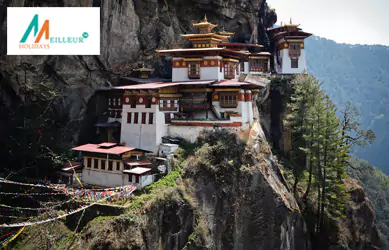
17680/-
Book Bhutan Tour 5 Nights / 6 Days
Package Tour At Best Price
BOOK BHUTAN PACKAGE TOUR, BHUTAN TOUR PACKAGES FROM KOLKATA AT BEST PRICE | CALL +91-9836117777
FREE VISA - NO VISA REQUIRED for tourists to travel 'THAILAND / SRILANKA / MALAYASIA'
Meilleur Holidays Quick Links
Affiliation & Membership








